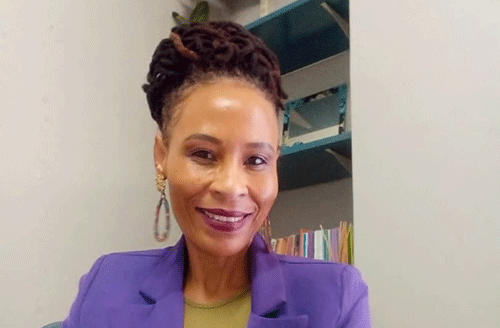Lahja Nashuuta
Ngeve Shangombe is a distinguished civil servant and language educator currently serving as the Senior Education Officer for Khoekhoegowab and Curriculum Developer in the education ministry’s National Institute for Educational Development (NIED).
In her role, she is tasked with the development of syllabuses and educational materials for Khoekhoegowab, catering to students in grades 4 to 12, which includes both Ordinary Level and Advanced Subsidiary Level curricula.
Additionally, she actively promotes the Khoekhoegowab curriculum, and facilitates training workshops for educators.
Shangombe hails from the small settlement of Tubusis, located at the foot of the Erongo Mountains in Namibia, where she is the third child in her family.
Educational journey
Shangombe possesses a diverse array of qualifications, including a Basic Education Teacher’s Diploma (BETD) from the Windhoek College of Education, an Advanced Diploma in English from North-West University in Potchefstroom, and a B.Ed Honors in Curriculum Development from the same institution.
“I began my career in the Namibian public service in 2004, teaching Khoekhoegowab and English at the Junior Secondary Phase for seven years. I then worked for three years as an education officer for Khoekhoegowab at the Hardap Regional Directorate of Education, Arts and Culture,” she said.
She subsequently took on the position of senior education officer for African Languages at the Erongo Regional Directorate of Education,Arts and Culture, a role she maintained for six years.
Narrating her education journey, Shangombe said, “After high school, I faced financial barriers to further my studies, but stayed engaged with youth programmes.
I was fortunate enough to be accepted into an educational programme through the National Youth Service, where I received training in tailoring, and earned a diploma in fashion design.”
Shangombe told New Era that she worked as a tailor for a year at United Africa Group and then as a cashier at Checkers at Gustav Voights.
“Eventually, I applied to the Windhoek College of Education, and was accepted to study Khoekhoegowab and English,” she said.
Public service
She divulged that her entry into the public service was not a matter of personal choice, but rather a necessity, given that many educational institutions were public.
“Teaching was not my initial dream; as a teenager, I aspired to study law. However, I had to abandon that dream due to lack of opportunities for further studies at the time,” she said.
After becoming a teacher, she developed a passion for education, particularly the Khoekhoegowab language
“I find satisfaction in seeing more students enrols, in Khoekhoegowab across all educational phases, and in the increasing number of students completing high school with Khoekhoegowab at the Ordinary and Advanced Subsidiary levels,” noted the civil servant.
Although she finds her involvement in the development of Khoekhoegowab materials to be highly fulfilling, she notes a significant lack of awareness among Khoekhoegowab-speakers about the importance of their language and cultural identity.
“I believe that language is a key component of one’s identity, and losing it diminishes cultural richness. Our unique heritage deserves recognition and preservation,” said Shangombe.
Work-related achievements
She highlighted her accomplishment of teaching a grade eight student with dyslexia to read, even after he had left school.
“I also received early promotions, allowing me to supervise and mentor older teachers. Additionally, I successfully advocated for community campaigns to educate parents about the language policy, leading to increased enrolment in Khoekhoegowab programmes,” she said.
Shangombe noted that her commitment to the public sector is driven by job security, medical benefits and housing subsidies associated with her position, in addition to the opportunities for further education available while maintaining a permanent role.
“I love my career, and appreciate the support from my work community, which has significantly contributed to my professional growth. Growing up with an identity crisis, I never anticipated becoming a national leader for a language I initially studied just to gain entry to a tertiary institution. Now, I realise that my career path was destined for me long before I recognised it.”
The civil servant addressed the misunderstanding surrounding the productivity of public servants.
“I disagree. In my experience, my work is demanding and challenging, and I have witnessed numerous competent and dedicated colleagues who consistently go above and beyond, often working outside of regular hours to deliver their best.” -lnashuuta@gmail.com


